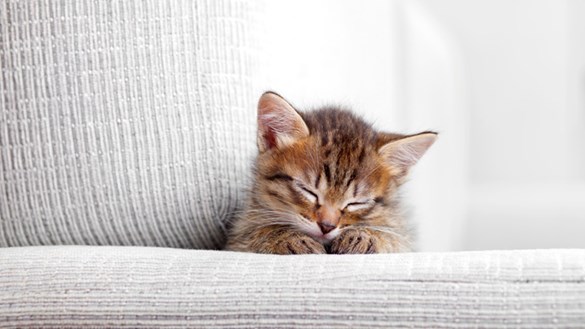Cat Neutering
Neutering is a medical procedure which stops your cat being able to breed. At Medivet we understand it’s a big decision and one which you want to make sure is right for your pet. We’re here to help, whether you simply need advice or want to book an appointment and find out more about your options.

What is neutering?
Neutering is a medical procedure which involves removing your cat’s internal reproductive organs to stop them breeding or becoming pregnant. For male cats it’s called castration. For females, it’s referred to as spaying. Neutering also offers potential health benefits such as reducing the risk of some cancers, aggression and unwanted sexual behaviours.
The difference between spaying and castration
Neutering is a catch-all term for the surgical process to stop a cat from breeding or becoming pregnant. For females it is referred to as spaying, for males it is referred to as castration.
- Spaying – Your vet will make an incision in your female cat’s abdomen and remove her ovaries and uterus (ovariohysterectomy). It is a surgical procedure and your cat will be given a general anaesthetic and pain relief
- Castration – In male cats the vet will remove the testicles (orchidectomy) by making a small incision in the scrotum
Do cats need to be neutered?
As a responsible owner, it’s up to you to decide what’s best for your pet. There are no hard and fast rules around whether your cat should be neutered, and our vets can help you decide what’s best for your pet’s individual circumstances.
Many owners get their pets neutered because they don’t want to breed from them or want to remove the risk of unwanted pregnancy. Others prefer to leave it to nature. Unless your cat is a house cat and never likely to venture outside it’s very challenging to keep both intact males and females indoors and away from other animals so neutering at a young age is often recommended. Whatever you choose, remember it’s your choice and our vets are here to help you make it.
When should you neuter your cat?
Female cats are usually spayed between four and six months. They can start having kittens from this age so if you don’t want to breed from them, it’s important to get them neutered as soon as possible to prevent unwanted litters. However, older cats can still be neutered safely. Your vet will tell when the best time for the procedure is based on your pet’s unique needs.
What are the benefits of neutering your cat?
Neutering prevents unwanted litters and more cats being born than there are homes available. Aside from preventing pregnancy in females, neutering at this age may also prevent behaviours they display from being in heat such as trying to escape or wandering further than normal. It can also stop womb infections and reduce the risk of tumours.
In males, it may help prevent or reduce unwanted behaviours such as spraying or roaming before they begin. It can also reduce aggression or fighting with other animals.
In both males and females, it can cut the risk of some health conditions early on and prevent the spread of infectious diseases such as feline immunodeficiency virus (FIV) and feline leukaemia virus (FeLV).
Are there any risks?
Neutering can raise the risk of certain illnesses. Castrated male cats may have more urinary problems while both male and female cats have an increased chance of developing certain cancers (carcinoma, lymphoma, mast cell tumours and sarcomas). Your vet will explain to you all the benefits and risks of the procedure so you can make informed decision.

Does neutering affect a cat’s behaviour?
Neutering may affect your cat’s behaviour. It can make them less aggressive, especially males, and reduce the risk of them getting into fights and sustaining injuries or infections with other cats. Neutered cats also tend to stay closer to home reducing the risk of them getting lost or being run over.
It may reduce or eliminate unwanted behaviours like spraying and marking. In both males and females it can also lead to less hormone-driven actions like restlessness, yowling, or trying to escape during mating seasons. Equally, it’s important to remember that these behaviours may continue even after they’re neutered as it’s part of their nature. Speak to your vet if you’re concerned about any of your pet’s behaviours.
And lastly, if you’re worried it will change their personality don’t be. While neutering can affect some behaviours if your pet was playful or affectionate before the procedure, they’ll still be playful and affectionate after.
What to expect before and after neutering
Before
Your vet will check your cat over before the procedure to make sure they’re healthy and suitable for surgery. They’ll also explain to you what’ll happen on the day.
Usually, you’ll be asked to withhold food from your cat for six to 12 hours before the procedure though water is normally allowed.
Neutering is a relatively short procedure and you’ll be able to take your cat home the same day.
After
It’s normal for your cat to be a little groggy or sleepy for a few hours afterwards as the anaesthesia wears off. They should be more like their old self within a day or two.
Your vet will prescribe pain relief for the first few days and it’s important to keep the incision area clean and dry. Prevent your cat from licking the area and put on a cone if necessary.
Try and limit their activity for seven to 10 days – no running or jumping. Keep them indoors and in a quiet, comfortable room. Depending on the type of stitches used they may need to come in to have them removed though lots of vets use dissolvable ones.
Overall, recovery is usually quick and most cats return to their normal activities within a few days. Follow your vet’s instructions as closely as possible to aid their recovery.
Find a Medivet practice near you
If you’re looking for a trusted vet to take care of your cat’s neutering and keep them in good health, Medivet can help. Find your nearest location and our team will be happy to support you through the neutering process.

Puppy And Kitten Checks
Get your new pet off to the right start. We’re proud to offer complimentary health checks for your new puppy or kitten under the age of one.
Learn more

Your Essential Puppy And Kitten Guide
Getting a new puppy or kitten is an exciting time, but it can be stressful too. Read our essential guides for caring for your puppy or kitten and download your free Puppy and Kitten Guide, packed with information about their first year.
Read guide

